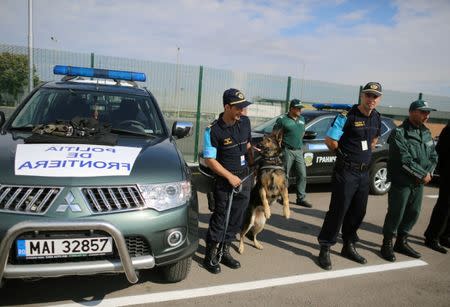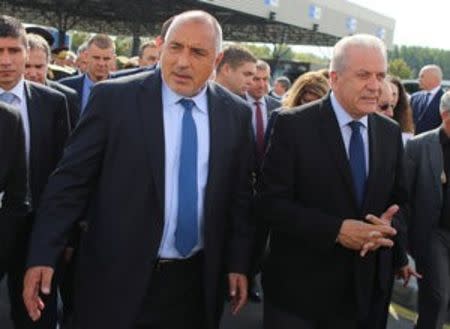EU launches joint border guard to keep migrants out
By Angel Krasimirov KAPITAN ANDREEVO, Bulgaria (Reuters) - The European Union launched a joint border guard force on Thursday as it tries to prevent any repeat of an uncontrolled influx of migrants and refugees last year that has opened up gaping rifts between member states. Overwhelmed by the arrival of some 1.3 million people in 2015, the EU has increasingly focussed on sealing its external borders. The new force is designed to deploy quickly and flexibly to any location on the bloc's frontiers. "The establishment of the agency is a symbol of the EU, of a Europe that is able to deliver, that is proving its efficiency in addressing the migration and security challenges we are faced with," EU Migration Commissioner Dimitris Avramopoulos told a ceremony at a Bulgarian border point with Turkey. The new body is due to have 1,000 staff and a reserve pool of 1,500 border guards designated by member states. In the past, however, EU governments have often been slow to provide such reinforcements. It will have some 120 officers in Bulgaria, which shares a land border with Turkey and whose prime minister Boiko Borisov has previously criticised the EU's response to the migrant crisis as too soft. Brussels has also pledged 160 million euros (141.58 million pound) to Bulgaria to help it police its borders. "This no longer is the EU we loved criticising. The EU has shown it can be quick, effective, united, take actions in the field," said Borisov, who built a controversial fence that has cut arrivals from Turkey by a third this year to 12,500 people. BUNDLE OF WOES While arrivals in Bulgaria and Greece, the main point of entry to Europe last year, have dropped, the numbers in Italy are the same, a growing worry for Rome and Brussels. Responses to the migrant crisis have ranged from Germany taking in more than a million migrants last year to Hungary's emphatic rejection of any EU attempts to oblige it to accept a small number of asylum-seekers. The spats have added to the EU's woes as it struggles with weak economies, growing euroscepticism and the prospect of Britain's departure. Bitter divisions over how to distribute the refugees across the continent have led the EU to adopt an increasingly tough stance on economic migrants, many of them from African countries, and people who cross illegally. Avramopoulos said the bloc needed to focus on its policy for returning such people. "The door is open for the ones who are eligible for international protection. And closed to the ones who want to cross our borders illegally," he said. The EU has said it will make development aid to poor countries in Africa and elsewhere conditional on them keeping a lid on migration to Europe. It signed a political agreement with Afghanistan this month on facilitating returns, and wants to seal similar ones with Egypt and Tunisia, among others. (Writing by Gabriela Baczynska; Editing by Mark Trevelyan)

 Yahoo News
Yahoo News 



